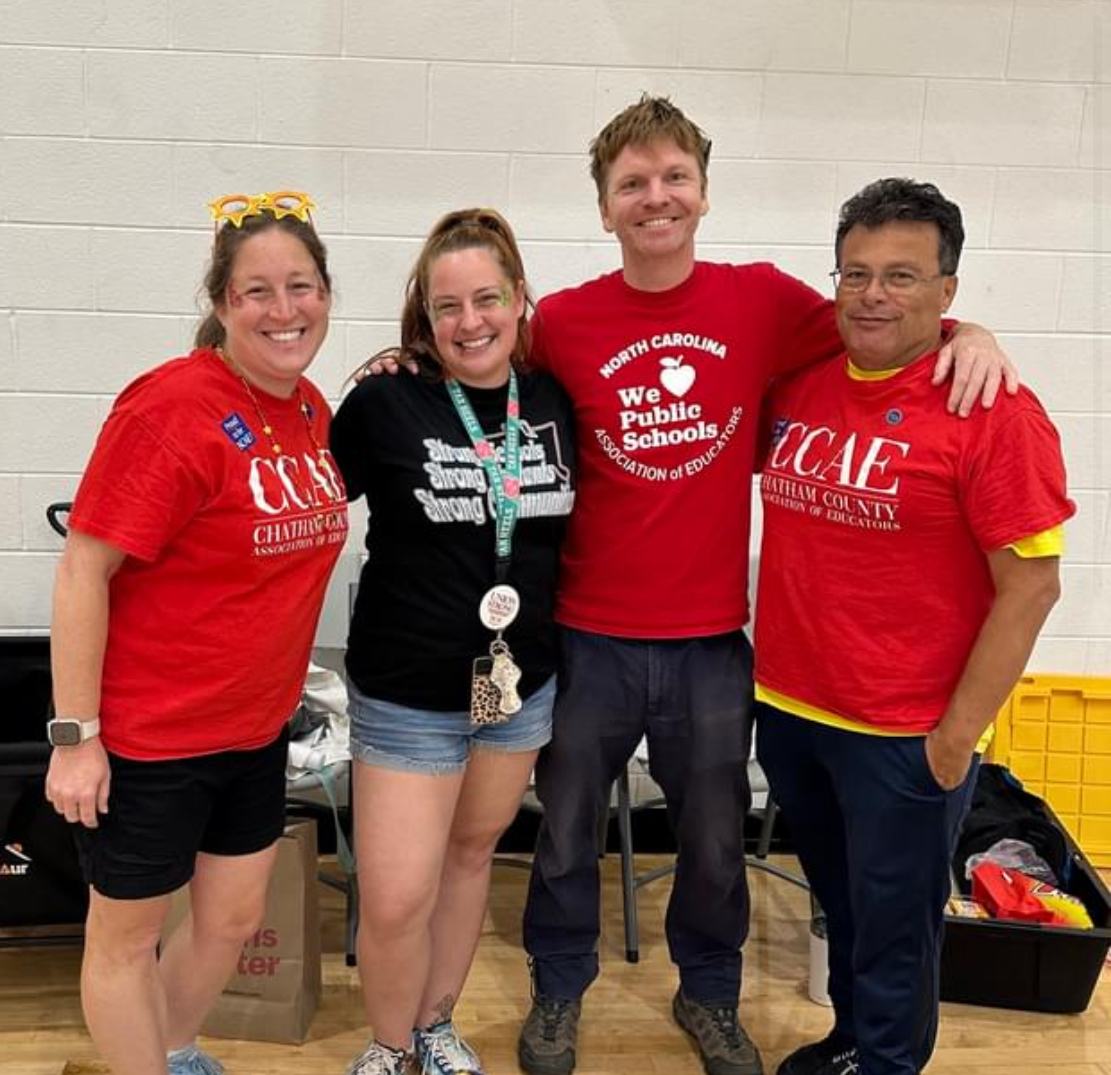
When Jennifer Tuite, a 3rd grade teacher at Perry Harrison Elementary, graduated from UNC Chapel Hill in 2003 with a degree in elementary education, she looked far and wide for a teaching position. To get her foot in the door, she was willing to take an assistant teaching position, even a substitute one. But finding a teaching job at that time was hard to come by, so when she and her husband, Ben, moved to Bloomington, Indiana, for him to pursue his law degree she decided to get her master’s in language education. Armed with two degrees, and having moved back to North Carolina, Tuite had a slightly easier time finding a teaching position in 2007 when she landed as a 5th grade teacher in Wake County. And since she had that master’s degree, she was paid 10 percent more.
Today it’s hard to imagine it being nearly impossible to find a teaching position as many school districts across the state are facing teaching shortages—40 days into the 2024-25 school year there were 7,141 vacancies, including 3,000 in the core classes of math, English, science, and social studies (WUNC). The abundance of vacant positions is due in large part to North Carolina’s unwillingness to pay teachers competitive salaries. Since 2013 pay for North Carolina teachers has ranked in the bottom 10-15 states and currently ranks 43rd in average teacher salary and 39th in starting teacher pay. At an average starting salary of $42,542, that’s well below the state’s average living-wage income of $49,575 (Zippia). In 2013, North Carolina also became the first state to eliminate the automatic master’s degree pay supplement for public school teachers, making it even harder to attract and retain quality teachers.
Tuite has held teaching positions in numerous public school districts, at a private institution, at a magnet school, and at a charter school. She’s also taught students in almost all K-12 grades, including exceptional children (EC). While she admits there are advantages to teaching at private and nontraditional schools, such as caps on class sizes, Tuite’s heart is in public education. Her own kids—Sarah (11) and John (9)—attend Pollard Middle and Perry Harrison Elementary.
Having experienced teaching in North Carolina’s public schools before such low teacher salaries and per-pupil funding—NC is 48th in the country in per-pupil funding (Education Law Center)—Tuite knows firsthand what it’s like to have a teaching assistant in a 2nd grade classroom. “If I had an assistant in my 3rd grade class now, I could do my job without all of the busy, non-teaching tasks,” she said. “It’s the little tasks that add up to big time and energy demands like making copies and pulling additional intervention groups. Just to have another adult in the room is huge.”
Over the years, as she’s taught, Tuite said she has had to do more with less. So about three years ago, she decided it was time to advocate for herself and her fellow teachers. She started by carrying signs at a Chatham County Association of Educators (CCAE) polling event. “It felt good to be doing something,” she said. That experience led to her joining CCAE—a branch of the North Carolina Association of Educators (NCAE) also known as the public school employees’ union—and then becoming its vice president in 2024. CCAE’s president, Brandy Varner, is also a 3rd grade teacher, but at Chatham Grove Elementary, and her son, Rosie, attends Pollard Middle. Varner and Tuite met at Perry Harrison Elementary in 2018 and then re-connected when they were both working on CCAE’s 2024 campaign to increase local salary supplements for all Chatham County Schools’ teachers. (Note: CCAE petitioned for $2,700 and teachers each received $2,000).
Because of their hard work on the campaign, the outgoing president asked if Varner and Tuite would step into the president and vice president roles. Together, they led the 2025 campaign, which called for compensating teachers with master’s degrees and providing incentive pay to EC teachers, instructional assistants, and bilingual classified staff. They were victorious in getting master’s pay, but fell short in incentive pay. “We are thrilled that the Board of Education and the Board of Commissioners supported our request for master’s pay,” said Varner. “And we will continue to work on supplements, especially for EC teachers, whose jobs are so hard to fill because there is so much more work that goes into teaching students with special needs.”
Besides building campaigns, Tuite and Varner also spend time canvassing the county, asking teachers and school employees to become members of CCAE. While the cost to join may seem steep—dues are $525 annually for a full-time teacher—Varner believes it’s worth every penny. “It is a sacrifice,” she said. “But I’ve come to understand that through organized, collective action, we can make a difference.” Varner points out that not only does NCAE help lobby lawmakers in Raleigh, but they also provide legal help and access to professional development.
The ultimate goal is for CCAE to obtain majority membership—meaning more than half of CCS staff would need to become members. (As of June, CCAE has 229 members and there are about 1,200 total staff at CCS.) Reaching majority membership would allow CCAE to ask for a formal voice on the Board of Education. And that would guarantee that no matter the makeup of the local government, there would be educator input on issues that directly impact both teachers and students.
When Tuite started on her path to becoming a teacher, she had no idea that advocating for critical things such as a living wage and smaller class sizes would essentially become a second full-time job—on top of her teaching position and another part-time job. But for teachers like Tuite and Varner, the extra effort is worth it if it means our schools and students get what they deserve. “Things don’t get better when we sit still or are driven out of our profession,” Varner said. And without great teachers, students will miss out on the kind of learning that changes lives.
You don’t have to be a teacher to join CCAE—community members, parents, and retired educators can join too! Visit ncae.org/join or check CCAE out on facebook.com/ChathamEducators.
